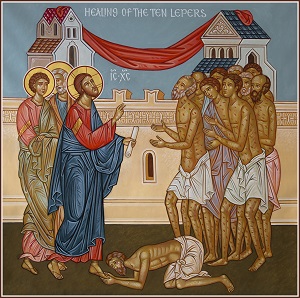I think
the worst thing we could ever teach someone is that they should keep their
distance from Jesus. Yet, this is what
these ten lepers were taught. Not specifically
from Jesus, of course, they’d been taught to keep their distance from everyone
who didn’t share their disease. When the
first signs of leprosy were noticed on someone’s skin, there would be a funeral
style liturgy in which the victim would be mourned as if dead when cast out of
the community, shunned, told to remain perpetually separate, to cry out to warn
people not to come near them. They were
taught that their skin was so dreadful, literally, something that people
dreaded so, that they must keep away, because they were dangerous, because they
were to be feared. They were taught to
hate their own skin, taught that the only useful thing they could do with their
lives was to help others avoid them.
So, when
Jesus even talks with them, even lets his gaze rest upon them, he’s disrupting
a pattern. He’s doing something risky on
the basis of much ancient medicine, letting his eyes be imprinted with disease,
which could harm him. There’s no reason
to think that Jesus didn’t think of this as risky; there’s every reason to be
sure that he never lets risk keep him from loving someone. So, he looks, he talks, and he directs them
to go to the priests. In both Israel and
Samaria, the priests functioned as kind of ‘purity inspectors.’ They made no claims to be able to cure
leprosy, but they could diagnose it, and functioned as gate-keepers for who got
included and who got shunned, deciding whose skin was to be feared.
And all
ten of the lepers have enough faith to go, despite the fact that the text tells
us that none of them were cured at the point when they turn around and start
going to their respective priests (the Samaritan the most daring, as he goes
alone to find a Samaritan priest). They
go, prepared to be laughed at, derided, chased out of town, failing in their
one mission to help others avoid them, exposing again their dreaded skin to
authoritative inspection. Their willing
obedience to Jesus’ word is witness and challenge enough to us. As Paul says,
there’s power in Jesus’ word. It’s not chained, and neither are these lepers once
they’ve heard it.
One, the
Samaritan realizes that he’s been healed. He’s the only one we hear that of. The other nine have drunk so deeply of the toxic
Kool-Aid that they’ve internalized the message behind their shunning: that
their skin is dreadful, they’re dangerous, they’re to be feared. We can’t see what we don’t consider possible,
and their sense of the possible has been so assaulted that they can’t conceive
of their bodies as having dignity, they can’t notice they’ve been cured. But, somehow, the Samaritan can. That original spark of divine brilliance so
dimmed and defiled has not been extinguished.
Despite all the marginalization, this one notices. He’s been healed. Not just cured, it’s not just that his
symptoms have been taken away, he’s been healed, he’s been restored to
wholeness, a wholeness that allows him to express the fullness of his dignity
in the highest human act going: giving thanks to God. Augustine would talk about learning to say
thank you as they fundamental task of discipleship. There’s power in Jesus’
word. It’s not chained. It forms this man for thanksgiving.
Here in
this Eucharist, we are formed for thanksgiving. That’s what the word Eucharist
means in Greek, thanksgiving. For Christ’s word is proclaimed here, and Christ’s
word has power, it is not chained. Here in this Eucharist, we become more aware
of what we need to be healed of, we become more away of our brokenness and of our
sin. But that shouldn’t train us to hide ourselves, to help others avoid us,
but Christ is rewriting that script. Here, the crucifix is carried through our
midst. Here, Jesus Christ, body, blood, soul and divinity, is present under
form of bread and wine, and doesn’t keep his distance but comes even closer, so
much closer, to us than he did to those lepers. For many of us he comes through
reception of the Eucharist. Eating. Drinking. For all of us he comes through
the word, the unchained word, and the privilege of watching his body break for
us.
And that
message, that no-one’s aim in life is to help other people avoid them, matters.
Because we still teach people that. Jesus still has a script to flip. We may
but shun literal lepers, but we still make people feel feared because of what
their skin looks like. We are part of a
society that tells young black men, especially those with strong-looking
bodies, that people are scared of them, and they should do whatever is
necessary to avoid that, to be less dreaded, because that’s the only way for
them to stay safe. Our society has said the same thing to people who are HIV+,
by so cultivating an irrational fear of their bodies that the Fair Housing Act
had to be re-written so that they could participate fairly in that market. Our
society weaponizes fear to shun and marginalize.
Have we
not learned from Lazarus and the rich man?
That when we inscribe chasms in our world, God may well respect those,
but we can’t expect Him to put heaven on our side of the chasm? Our world is so in need of healing. And all this fear touches our hearts too. We are in so much need of healing. And Jesus has so much to give. His word has
power; it is not chained. It will form of us for a life of eternal
thanksgiving.

No comments:
Post a Comment